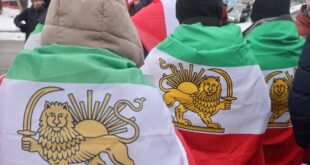 TEHRAN (Fars News Agency)- Iran stressed on Tuesday that his country was still cooperating with the International Atomic Energy Agency despite announcing a day earlier that it had banned 38 of the UN watchdog’s inspectors from working in the country.
TEHRAN (Fars News Agency)- Iran stressed on Tuesday that his country was still cooperating with the International Atomic Energy Agency despite announcing a day earlier that it had banned 38 of the UN watchdog’s inspectors from working in the country.
Iran barred the UN watchdog’s inspectors, all Western nationals, after parliament demanded retaliation for UN sanctions imposed on Tehran last month.
The IAEA said this would not handicap its monitoring of a plant where Iran plans soon to expand its output of nuclear fuel from an experimental to an industrial-scale level.
“We have no problem in connection with the IAEA and we will continue our cooperation in the framework of our past cooperation. The IAEA’s activities in Iran go on,” Government Spokesman Gholam Hossein Elham said during his weekly press briefing.
He also dismissed the UN Security Council’s decision to prohibit transfers of sensitive materials and know-how to Iran’s nuclear and missile programs over its refusal to stop enriching uranium.
“Nuclear technology is indigenous and these sanctions don’t have any effects on it. Such sanctions will have no effect on us,” the government spokesman said a day after the European Union called for the full implementation of UN sanctions imposed on Iran for its refusal to suspend uranium enrichment.
Elham said that Iran would press ahead with its nuclear fuel cycle work despite the sanctions.
“This sanction does not affect our national will to complete the fuel cycle in order to meet industrial needs and the development of the country, which has started and will continue,” he said.
Iranian foreign ministry spokesman Mohammad Ali Hosseini advised the European Union to distance itself from the United States, saying attempts to apply sanctions are “irrational”.
“It is deplorable that the European Union bases its certain irrational decisions on the unjust and unlawful resolution 1737.
“The European Union should not link its vital interests in the region with America’s provocative approaches,” he said in a statement on Tuesday.
Iran said on Monday it would block 38 International Atomic Energy Agency (IAEA) inspectors from entering the country in reprisal for the sanctions.
The Vienna-based IAEA said it was discussing the issue with Iran, but added that it could continue monitoring its nuclear facilities even without the presence of inspectors.
Elham said on Tuesday, however, that Iran would “continue working with the IAEA”.
Meantime, Iran’s permanent representative to the International Atomic Energy Agency Ali Asqar Soltanieh here on Tuesday stressed that all IAEA member states are entitled to omit some names from the list of inspectors the UN nuclear watchdog presents to them.
“According to the NPT Comprehensive Safeguard Agreement, all the member states are entitled to exclude name of whoever they wish from the list of appointed inspectors and they are not required to present explanations or the reason for their decision,” Soltanieh told FNA.
“Paragraph 85 of document Infcirc/153 of the Comprehensive Safeguard Agreement stresses this right,” he reiterated, adding, “Therefore, Iran’s decision for removing 38 of around the 200 inspectors appointed by the IAEA is fully natural.”
Asked if IAEA inspections of Iran’s nuclear sites have been halted, the nuclear official said that his country’s nuclear facilities and installations, including Natanz enrichment facility, are under the routine inspection program of the UN nuclear watchdog.
 Eurasia Press & News
Eurasia Press & News



